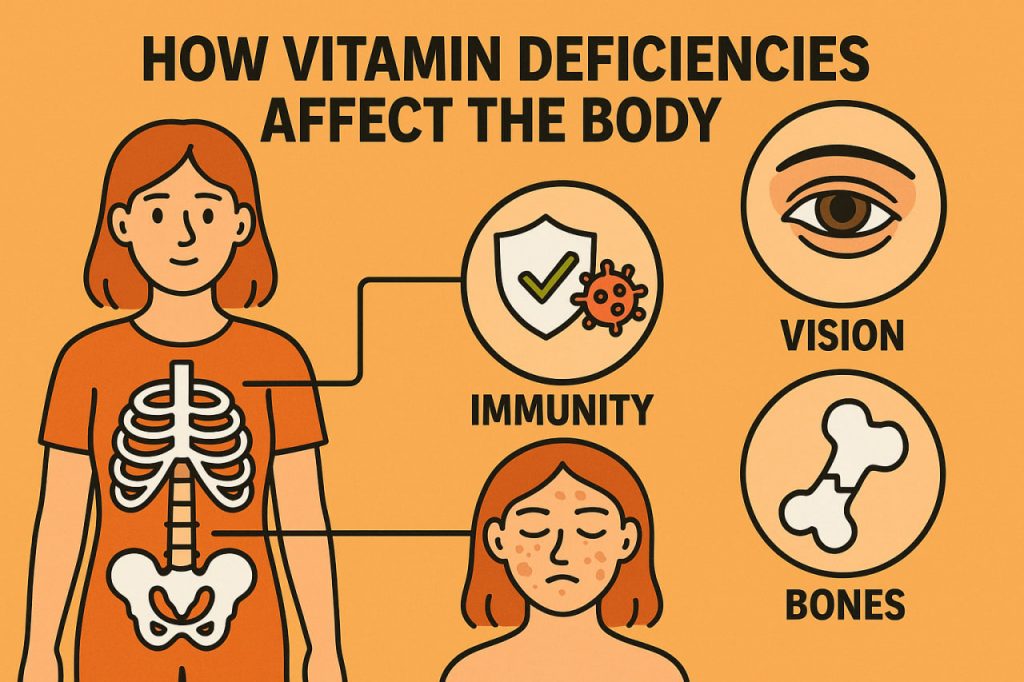Vitamins are essential nutrients that the body needs in small amounts to function properly. They regulate metabolism, support growth and repair, and strengthen the immune system. Unlike macronutrients such as proteins or carbohydrates, vitamins do not provide energy directly but act as crucial helpers in biochemical reactions. When the body does not receive enough vitamins, either from diet or absorption problems, it can lead to deficiency, which negatively impacts organs, tissues, and overall health.
Vitamin A Deficiency
Vitamin A is vital for vision, skin health, and the immune system. A lack of this vitamin can lead to night blindness, dry skin, and a weakened immune response. Severe deficiency can even cause permanent blindness. Since vitamin A also supports cell growth, children suffering from deficiency may experience stunted development.
Vitamin B Deficiency
The B vitamins (such as B1, B6, B12, and folate) play important roles in energy production and nervous system function. Deficiencies may lead to fatigue, weakness, and neurological problems. For example:
- Lack of B1 (thiamine) can cause beriberi, affecting muscles and the heart.
- Lack of B12 can cause anemia and nerve damage.
- Folate deficiency can lead to birth defects during pregnancy.
Vitamin C Deficiency
Vitamin C is necessary for collagen production, wound healing, and immune defense. A lack of it leads to scurvy, a disease historically common among sailors. Symptoms include bleeding gums, fragile skin, slow wound healing, and joint pain. Even mild deficiency weakens immunity and increases susceptibility to infections.
Vitamin D Deficiency
Known as the “sunshine vitamin,” vitamin D regulates calcium absorption and bone health. A deficiency can cause rickets in children, leading to soft and deformed bones, and osteomalacia or osteoporosis in adults, resulting in fragile bones. Vitamin D deficiency has also been linked to weakened immunity and muscle weakness.
Vitamin E Deficiency
Vitamin E acts as an antioxidant, protecting cells from damage. Deficiency is rare but can lead to muscle weakness, nerve problems, and impaired vision. Since it plays a role in immune defense, low levels may also make the body more vulnerable to infections.
Vitamin K Deficiency
Vitamin K is essential for blood clotting and bone health. Without enough of it, the body cannot stop bleeding effectively, leading to excessive bruising and dangerous bleeding episodes. In newborns, deficiency is especially risky, which is why vitamin K supplementation is often provided at birth.
Conclusion
Vitamin deficiencies can have serious consequences for the body, affecting vision, bones, immunity, skin, blood, and the nervous system. Each vitamin has a unique role, and even a small shortage can disturb health. The best way to prevent deficiencies is through a varied diet rich in fruits, vegetables, whole grains, dairy, and proteins. In cases of chronic deficiency or medical conditions, professional consultation is necessary before considering supplementation.
Glossary
- Deficiency – the state of lacking an essential nutrient required for normal body function.
- Anemia – a condition caused by insufficient red blood cells or hemoglobin, often linked to vitamin deficiencies.
- Collagen – a structural protein essential for skin, bones, and connective tissue.
- Osteoporosis – a condition in which bones become weak and brittle.
- Antioxidant – a substance that protects cells from damage caused by free radicals.


